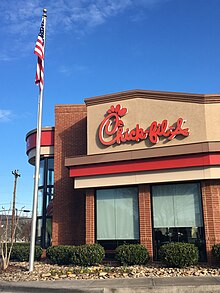In the world of fast-food chains, Chick-fil-A stands out as a beloved and successful brand. With its signature chicken sandwiches and commitment to exceptional service, it has captured the hearts and taste buds of millions of customers.
For those with an interest in investing, the question may arise: can you buy stock in Chick-fil-A?
In this article, we will explore the fascinating story behind Chick-fil-A’s success, delve into the basics of investing and stocks, discuss publicly-traded companies, clarify Chick-fil-A’s stock availability (or lack thereof), analyze their financial performance, and uncover the unique corporate culture that contributes to their triumph.
So let’s dive in!
The Story Behind Chick-fil-A’s Success
Chick-fil-A, a popular fast-food chain founded in 1946 by S. Truett Cathy, has grown from a small restaurant in Georgia to one of the most successful chains in the United States. Their commitment to quality ingredients and exceptional customer service has garnered them a loyal following.
Despite being closed on Sundays for religious reasons, Chick-fil-A consistently outperforms competitors in sales per restaurant. This success is attributed to their unique business model, where they maintain ownership and control over the majority of their restaurants.
By upholding their values and delivering an outstanding dining experience, Chick-fil-A continues to thrive as a beloved fast-food chain.
Understanding Stocks and Investing Basics
To navigate the world of investing, it’s crucial to understand stocks. Stocks represent ownership in a company, making shareholders potential beneficiaries of its success. These securities are bought and sold on stock exchanges like the NYSE, providing a platform for investors. There are two main types of stocks: common stocks and preferred stocks.
Common stocks offer voting rights and potential dividends, while preferred stocks prioritize dividend payments. By grasping these basics, investors can make informed decisions when entering the market.
| Types of Stocks | Definition |
|---|---|
| Common Stocks | Represent ownership in a company, with voting rights and potential dividends. |
| Preferred Stocks | Typically lack voting rights but prioritize dividend payments. |
In summary, understanding stocks is essential for successful investing. With knowledge of how they function and the different types available, investors can navigate the market confidently.
Exploring Publicly-Traded Companies
Publicly-traded companies are businesses whose shares are available for purchase on stock exchanges like the NYSE and NASDAQ. They undergo an initial public offering (IPO) to raise capital from investors. Going public offers advantages such as access to capital, increased visibility, and liquidity for shareholders.
However, it also brings drawbacks like increased regulatory requirements, pressure to meet quarterly earnings expectations, and potential loss of control for founders. Examples of well-known publicly-traded companies include McDonald’s, Starbucks, and Coca-Cola.
Understanding these dynamics is crucial for investors considering investing in publicly-traded companies.
Can You Buy Stock in Chick-fil-A?
Unfortunately, Chick-fil-A is not publicly traded, so its shares are not available for purchase on stock exchanges like the NYSE or NASDAQ. Private companies like Chick-fil-A often choose to remain private to maintain control over their operations and values.
This allows them to focus on long-term growth strategies without being beholden to shareholders’ short-term demands. While you can’t buy stock in Chick-fil-A, they offer alternative investment options such as partnerships or franchise opportunities for individuals interested in supporting the company’s success while maintaining its private status.
Chick-fil-A’s Stock Price and Earnings
To navigate the financial landscape of Chick-fil-A, it is important to understand that as a private company, its stock prices are not publicly available. This lack of transparency makes it challenging for investors and analysts to analyze the historical performance of Chick-fil-A’s stock.
However, despite this limitation, Chick-fil-A has managed to achieve an above-industry average net worth. This can be attributed to several factors that have contributed to their ongoing success. The dedication to quality is a cornerstone of their business philosophy.
From sourcing fresh ingredients to maintaining rigorous standards in food preparation, Chick-fil-A has built a reputation for delivering consistently high-quality products.
Another key factor in their above-average net worth is their unwavering commitment to exceptional customer service. Chick-fil-A understands the importance of creating a positive experience for every customer who walks through their doors.
Their friendly staff, efficient service, and attention to detail have earned them a loyal customer base that keeps coming back for more.
Moreover, the company’s distinctive corporate culture plays an instrumental role in driving its financial success. With strong values rooted in family, faith, and community involvement, Chick-fil-A has fostered a sense of trust and loyalty among both customers and employees alike.
While the lack of publicly-traded stock prevents us from analyzing specific numbers related to stock price and earnings, it is clear that Chick-fil-A’s strategic focus on quality, customer service, and building a loyal customer base have contributed significantly to their above-industry average net worth.
By constantly striving for excellence in all areas of their business operations, Chick-fil-A continues to solidify its position as one of the leading fast-food chains in the United States.
Despite operating as a private company with limited access to stock information, their success story serves as a testament to the power of exceptional products and services combined with an unwavering commitment to customer satisfaction.
The Corporate Culture at Chick-fil-A
Chick-fil-A owes its success to a unique corporate culture centered around values like integrity, kindness, and servant leadership. This culture influences how employees interact with customers and each other, creating a positive environment.
Motivated by these values, employees strive to provide exceptional service, resulting in satisfied customers and repeat business. This commitment to excellence drives Chick-fil-A’s overall success in the fast-food industry.
Conclusion
Chick-fil-A’s remarkable success story offers valuable insights into the world of investing, despite not being a publicly traded company. Understanding the basics of investing and stocks, as well as the concept of publicly-traded companies, allows investors to broaden their perspectives when considering different investment opportunities.
What sets Chick-fil-A apart is its unwavering commitment to excellence, unique business model, and strong corporate culture. These factors have propelled the fast-food chain to extraordinary heights within the industry.
By consistently delivering exceptional customer service and maintaining high-quality food standards, Chick-fil-A has fostered a loyal customer base and achieved remarkable growth.
Investors looking for a well-rounded portfolio should consider both public and private companies like Chick-fil-A. While public companies offer the advantage of liquidity through stock trading on public exchanges, private companies can present unique investment opportunities with potentially higher returns.
Adding privately held businesses like Chick-fil-A to one’s investment portfolio can provide diversification and exposure to sectors that are not readily available through publicly traded stocks.
However, it is important for investors to conduct thorough research before making any investment decisions. Evaluating a company’s financial performance, growth prospects, competitive landscape, and management team are crucial steps in assessing its potential as an investment opportunity.
[lyte id=’Xtfsq_OsP9U’]






